North Coast Anglican
Statement from The HeartA
Process for Justice
Reflections on the 38th Synod of the Diocese of Grafton
The Anglican Diocese of Grafton's Newest Appointments


Statement from The HeartA
Reflections on the 38th Synod of the Diocese of Grafton

We acknowledge the Bundjalung, Arakwal, Yaegl, Githabul, Gumbayngirr, Dunghutti and Birpai peoples, the traditional custodians of the lands on which the Diocese of Grafton is based. We pay tribute and respect to the elders of these nations and peoples, both past, present and emerging, acknowledge their continuing connection to the land and waters, and thank them for their protection of the mountains, hinterland, waters and coastline since time immemorial.

EDITORIAL TEAM
The Rev'd Vivian Hoskins, Jan Fryer, Kaytrina Jessup, The Ven. Tiffany Sparks, Anne Weekley
EDITOR DETAILS
PO Box 4 Grafton NSW 2460 nca@graftondiocese.org.au
DESIGNER
Yoohoo McPhee - Grafton
SUBSCRIPTIONS
Australia $16.00 p.a
Overseas $28.00 p.a
CIRCULATION
Circulation: 1,000
ADVERTISING
Please contact the Editor for rates and bookings.
Please send articles by email as a Word Doc. attachment. Photographs must be sent as email attachments in JPEG format, with a file size of 500kb or greater. Please contact the Editor to 'pitch' article ideas and to discuss due dates, word limits and image requirements.
The Editor is not responsible for the opinions expressed by any contributors, nor do their views necessarily reflect the policy of this publication or of the Diocese. Acceptance of advertisements does not necessarily mean endorsement of the product or services.
Front Page Image: First Nations leader the Rev'd Canon Uncle Glenn Loughrey visiting Bishop Druitt College's Foundation Day, with Dean Elect Rev’d Canon Naomi Cooke. Back Cover Image: Fireworks celebrations for BDC's 30th Anniversary party. Source: www.bdc.nsw.edu.au The Baptistry of Grafton Cathedral proudly displays Yaegl artist Frances Belle Parker's painting, which evokes the life-giving capacities of the Clarence River and reminds us that we stand on country that has long been sacred to the Indigenous peoples of this ancient land. In the spirit of Jacaranda Festival, the Cathedral community put together some beautiful flower arrangements for the locals and tourists to enjoy while exploring the city during this time of celebration.

Gallup polls reveal that anger is on the increase. Global surveys suggest that up to 22% of people in the world today “feel anger a lot”. This is an increase of almost 10% from the previous decade. Road rage incidents are on the increase and flight attendants, health care staff and hospitality workers are experiencing more abuse than ever before. Some are calling this the age of rage. Populist politicians play on people’s fears and resentments, normalising hatred and rage. A sobering cartoon depicts a campaigner seeking followers by espousing love and compassion, but few are attracted. Another leader is saying “Vote for me, I hate all the people you hate!”. This campaigner has attracted a large crowd of followers. The media compound the problem, offering us angertainment by focusing on the controversial extremists. It’s all very disturbing.
There is a story about two dogs entering the same room but at different times. One comes out wagging its tail and the other comes out growling. Watching this, a woman wonders what could possibly make one dog so happy and the other so angry? She finds that the room is filled with mirrors. The happy dog found a hundred happy dogs looking back at him, while the angry dog had seen only angry dogs.
At one level, anger is an attitude that we can choose or not choose. The author of Proverbs warns of the
dangers of anger: Whoever is slow to anger has great understanding, but one who has a hasty temper exalts folly (Prov 14:29). Witnessing injustice and oppression should make us angry, as it did Jesus (Mark 11:15). Yet it is God’s nature to be slow to anger, preferring mercy and grace: The Lord is gracious and merciful, slow to anger and abounding in steadfast love (Ps 145:8).
If we behave in angry ways it can be deeply harmful to those around us, but it can also be destructive for us. Is our anger going to help the situation that we are angry about? Probably not, and it’s unlikely to bring glory to God either. A solution can be to do something concrete, however modest, to improve the situation that we are angry about. What can set Christians apart in the age of rage is to consciously choose against anger and for God’s way of mercy and grace. For me, gratitude is part of the solution. Like the happy dog in the mirrored room, gratitude can be infectious and offer God’s light and hope to those around us, quietly challenging negativity and dissatisfaction. As the author of Colossians (3:16) wrote: Let the word of Christ dwell in you richly; teach and admonish one another in all wisdom; and with gratitude in your hearts sing psalms, hymns, and spiritual songs to God.

I acknowledge the Bundjalung, Arakwal, Yaegl, Githabul, Gumbayngirr, Dunghutti and Birpai peoples, the traditional custodians of the lands on which the Diocese of Grafton is based.
I pay tribute and respect to the elders of these nations and peoples, both past, present and emerging, acknowledge their continuing connection to the land and waters, and thank them for their protection of the mountains, hinterland, waters and coastline since time immemorial.
The visit of the Archbishop of Canterbury in October 2022 was the first visit of an Archbishop of Canterbury to the Diocese of Grafton in over seventy years. It was a highlight of what was in other respects a challenging year. In my Presidential Address last year I spoke about the devastating floods of February and March 2022. Archbishop Welby’s visit was in response to the floodshe specifically requested it for this reason. The visit was a great encouragement to the people of the Lismore region and to the wider diocese.
He met representatives of Lismore Parish, Anglicare North Coast and other organisations and community groups that played a part in disaster recovery in the region. He visited flood victims in their homes to see the damage and hear their stories, as well as talking to people in the street and visiting shops and businesses. The Archbishop has spoken extensively about climate change, and has been at the forefront of climate change initiatives. I know that Archbishop Welby, his wife Caroline, and his team were profoundly affected by their Lismore visit. He will use it to inform his speeches and other undertakings in relation to environmental action at the highest level.
During his visit the Archbishop briefly spent time with the Ordinands on Retreat at Ballina which was an encouragement to them. He also gave a public lecture entitled Building Peace in Robust Diversity at Emmanuel Anglican College, challenging us all to be agents of reconciliation in all our relationships. This theme of reconciliation is obviously a passion for Justin Welby¹ as it should be for all Christian disciples. It is a theme that runs through this Presidential Address.
On behalf of the whole diocese, I thank all those in the Registry, the Senior Clergy Team, Emmanuel Anglican College, Anglicare North Coast and the Parishes of Lismore and Ballina who put so much effort over several months into planning the visit of the Archbishop of Canterbury and his team.
Left: His Honour Richard Cogswell SC. Right: Saint David's Cathedral, Hobart. Sourced from Wikimedia Commons. This impressive painting by Frances Belle Parker provides a stunning backdrop in the Baptistry of Grafton Cathedral. This work evokes the life-giving capacities of the Clarence River and reminds us that we stand on country that has long been sacred to the indigenous peoples of this ancient land.Since time immemorial, our First Nations peoples here on the North Coast have cared for and protected the mountains, hinterland, waters and coastline. At this Synod we have been privileged to welcome The Rev’d Canon Professor Glenn Loughrey back to Grafton Diocese. Glenn has challenged us, above all, to listen. Our National Aboriginal Bishop, Chris McLeod, says that the wisdom of listening, as Jesus listened, is a forgotten art. He writes that Largely … as a nation we have not been very good at listening to the small and often silenced voices.
Part of this is to listen to a gracious invitation from the Aboriginal and Torres Strait Islander peoples of our land, known as the Uluru Statement from the Heart, a call to all Australians to create a better future together. Shamefully, Australia is the only first-world nation with a colonial history that doesn’t recognise its original inhabitants in its Constitution.
The pursuit of reconciliation and justice is fundamental to being followers of Jesus (eg., 2 Cor 5:18-19). On this journey of reconciliation Christians can lead by example. Jesus’ way is one of truth, justice, love and hope. Only together and with the deep listening called for by the Statement from the Heart, together with prayer, lament, and collective action for justice, can we build a strong reconciled Australia. I am thankful that faith leaders from across the country have strongly endorsed this walking together to a better future together. My Pastoral Letter on this topic expresses my support for the recognition of our Indigenous peoples in the Constitution. Let’s all approach this issue with generosity and vision and not fall victim to the scaremongering and fear tactics of some.
In response to a motion at Synod last year we have commenced a Reconciliation Action Planning process (RAP). The Bundjalung, Gumbayngirr, Arakwal, Yaegl, Githabul, Dunghutti and Birpai peoples of our region have a rich history and culture and I look forward to continuing to learn from them as we walk together through the RAP process.
In a time of division and fragmentation that affects all aspects of society Anglicans have a unique opportunity and responsibility to be agents of reconciliation.

The theme of reconciliation is also relevant to our relationships within the Anglican Communion. Since last Synod we have seen the establishment of a new denomination in Australia, known as the Diocese of the Southern Cross. Because it has caused confusion and distress amongst many Anglicans, I wrote a Pastoral Letter about it to clarify matters. Briefly put, the name of this new entity is misleading - it is not a Diocese of the Anglican Church of Australia.


As Bishop Stephen Pickard² stated recently, Anglican life has always involved living with tensions, apparent paradoxes, and a degree of messiness for the sake of comprehending the whole truth. It involves honouring, valuing, and staying in relationship with others with whom we differ. This has not always been an easy or simple matter. But such a commitment is premised on a deeply held belief that we only find the fullness of truth together and not apart. We bear with each other even as Christ bore our sufferings and gave witness to the grace and power of God.
Many in our Communion have been outraged by the decision of the Church of England to offer the blessing of same-sex marriages in church. I am deeply thankful that in Australia the bishops are still having constructive and respectful discussions on this divisive issue. This involves listening. I ask for continued patience as we listen to one another and seek a way forward in this province of the Anglican Communion. Personally, I value being part of a church where differences, and diversity of gifts, convictions and perspectives are welcomed as adding to the rich tapestry of God’s wisdom in the Body of Christ. As the statement quoted above goes on to say, this is the way of a truly comprehensive Anglicanism; something we believe is critical in times of conflict, division and fragmentation.
Together with other Chancellors and Bishops, our Chancellor, His Honour Richard Cogswell SC, and I were invited to meet with Jayne Ozanne in Sydney in March. Jane is an international campaigner for LGBT+ rights and is a faithful Anglican. The meeting was challenging yet

humbling. We still have a long way to go in making LGBT+ people feel welcomed and included in our ministry units. We can learn a lot from our Grafton Anglican Schools in this regard.
In a time of division and fragmentation that affects all aspects of society, including our own Communion, we have a responsibility to uphold and pursue a vision of unity and reconciliation. God wills fellowship.
It is now over five years since the Synod called for a restructure of the diocese and since Restructing for Mission and Ministry: Daring to Live into God’s Future for Us was adopted at the 2020 Synod much has been done. With the closure and sale of most of the identified worship centres having now taken place, we are now approaching the review of those worship centres that were classified by the Synod as needing a review at a future point. Allowing for delays due to COVID-19 and floods, this is now due in September this year.
We continue to embed the new models of ministry, including Ministry Areas and Networks. It is exciting to see the Ministry Initiatives Trust, set up from a percentage of the revenue from the sale of worship centres, enabling creative ministries. It is also encouraging to see Community Ministers being licensed in Ministry Areas, thus living out the vision for pioneer ministry. The Transitional Ministry Districts have agency to explore what ministry and mission can look like in their community under this new model. Encouraging also has been a more intentional connection between schools and parishes.
1. The Power of Reconciliation. Justin Welby. Bloomsbury (London), 2022. 2. A Comprehensive Anglicanism: Upholding the Church’s Unity and Witness to the Gospel. Stephen Pickard, May 2023.A key part of the restructure has been the goal of resourcing and equipping leaders and improving our governance. I am grateful to the Venerable Tiffany Sparks who organised our very first Diocesan Governance Conference - one of the first such gatherings in the Anglican Church of Australia. This was held in 2022. This conference, and future gatherings of this nature, will help to equip lay and ordained leaders in the task of leadership and governance.
While more will be said at other times and in other places about the forthcoming retirement of our Registrar and General Manager, Mr Chris Nelson, it’s appropriate for me to record here our gratitude for his outstanding service to the Diocese of Grafton and the Anglican Church of Australia.




The Diocese is in a much stronger position financially and in terms of governance, administration and reputation than it was in March 2014 when Chris commenced as Registrar and General Manager. Chris has assisted the Bishop-in-Council and the Corporate Trustees to undertake significant improvements in the administration of the diocese, restructuring and improving our governance. As Bishop I have benefitted from Chris’ extensive knowledge, professionalism, personal integrity and support. His deep faith in Jesus Christ has guided and strengthened Chris in his vocation as Registrar.

With her permission I quote my predecessor, The Rt Rev’d Dr Sarah Macneil, who writes about Chris in this way:
A man of deep faith, intellect, integrity and great skill and experience, Chris was absolutely integral to the work that was done to put the Diocese on a stronger financial and administrative footing, to address the impact of the Royal Commission into Institutional Responses to Child Sexual Abuse and to rebuild trust across the Diocese. He was a trusted colleague, always offering good advice and willing to disagree if he thought a proposed course of action was not the best available. Completely reliable (despite supporting Queensland in the State of Origin), thoughtful and wise, Chris ran a happy and efficient Diocesan office and was greatly respected by those who worked with him. He was, in my view, the Registrar we needed at that time and a gift from God to the Diocese.
Thank you Chris Nelson.
I conclude this Presidential Address with a presentation about the 2022 Lambeth Conference, the text of which is not included here.
Above from top: The newly ordained are presented with their Goodies Bags from ABM; members of the Bishop in Council and Corporate Trustees hear from Uncle Paul Paulson about the RAP process; The Bishop with the 41st Battalion of the Royal NSW Regiment at St Andrew’s Lismore; The Bishop with SCAS students in the Cathedral; The Opening of the ELC at Lindisfarne Anglican Grammar School.The sides are of equal size and shape but they face different directions and are different colours. The two sides visible are blue and yellow. The third side is purple. Each side has two edges connected to the other two sides, enabling the whole to stand upright. I have used this figure in the past to explain how God is Trinity; one God but three persons, designated as Father, Son and Holy Spirit. To me it is not surprising that a Trinitarian God expressing love and difference in a unity, created all human beings as being equal made in God’s image (Genesis 1:27), yet also different from each other.

As human beings in this world, we have certain rights and freedoms. In Australia we try to support these basic human rights by our laws, but they are sometimes disregarded. Lately we have heard of women being violated, an elderly person with dementia ill-treated, children abused, and Aboriginal people demeaned by racist acts.
As Christians, our faith, which affirms equality and difference, should support and confirm the rights of all people in the world regardless of skin colour, nationality, culture, age, sexual orientation, gender, economic state, health, disability, education, etc. If we turn to the Gospels, Jesus is seen as relating in respectful and caring ways to such people as a rejected Samaritan woman (John 4:7), a despised tax-collector (Luke 19:5) and banished children (Luke 18:16). Further, the risen Jesus appeared first to Mary Magdalene, a woman (John 20:15), and later to Peter, who three times denied knowing him, but was forgiven and trusted with an important task (John 21:15). These acts demonstrate how we, followers of Jesus, are to behave towards others.
Although we are all humans, we are all unique, different from one another and changing. There are times when I wish my computer would not update and make changes forcing me to treat it in a different way. However, to
continue to do my work well, I must be flexible and accepting, as we need to be in our relationships with one another, if all involved, are to grow and mature.
Difference and change is part of life in our world. In fact, all of God’s creation that we know, including animals, plants, soils etc. are different from each other and in a constant state of change. But not all changes are good.
By themselves differences and changes are neither good nor bad. It is up to us to discern what is good and what is bad in life. Loving and caring for the wellbeing of others is the good we are to encourage, and hate is the bad we are to change. Wars, injustices, ignoring the suffering of others and bitter arguments are some of the ways we can harm and even destroy those who are different from ourselves. To recognise and foster the good that is present in others and ourselves often takes deliberate effort on our part.
Returning to the triangular figure it witnesses to our limited vision. There is a purple side which we cannot see. We can fiercely deny it exists, or we can put aside our strong opinion, listen to someone in another place describing it as real, and accept the possibility. One day we may affirm this possibility as true, if we have changed our perspective even a little.
When we and another disagree, sometimes we are both right and we realise that our knowledge is very restricted and our world is more fascinating than we thought. We may even, as a result, learn to share and receive the love of God in new ways and places.
When Jesus, resting at a well in John 4, spoke to an outcast
To the right is a three sided object that can symbolise something about people being equal and different.
Samaritan woman whom he should have disregarded, his disciples were astonished. However, surprisingly, it led to many Samaritan people coming to Jesus and believing that he was indeed the Saviour of the world.
When human rights, and in consequence relationships, have been damaged and violated by words and acts of individuals, groups or nations, it is up to Christians to forgive and/or to ask for forgiveness, work for justice, and be open to dialogue that can change all involved and the situations. It may concern the treatment of asylum seekers, racism, bullying, etc. In such reconciling and healing acts, respectful loving friendships can develop. We Christians believe in a God who is not only three
persons in unity, but also a God of love whose love is able to love us equally, uniquely and differently. Whoever we are and wherever we are, we are all human beings loved by God, brothers and sisters deserving of respect.
As Christians, members of Christ’s body, we are especially called to reveal God’s compassionate love to all today. To live out such a vocation we have Jesus’ example and the Holy Spirit to guide us. Also, if we are open, God will work through us and other people different from ourselves, to help all of us to share God’s love, so, like the figure, we can together stand upright in God’s love.
Article courtesy of ABM. www.abmission.org/news/supporter-stories
40 years ago, Mrs Jennie and the Rev’d Dr Chris Elliot spent time working with ABM at St James Lockhart River on Cape York.
Nowadays, they are parishioners at St Matthews parish, Wauchope, where Jennie is the Parish Mission Secretary and serves on Parish Council. When the Wauchope Parish Council were deliberating which ABM project to support, Jennie suggested supporting the Diocese of North Queensland through ABM. Parish Council decided this personal link with the Diocese was significant and agreed.
The Rev’d Canon Angela Dutton is the Rector of this small rural parish in the hinterland of the Mid North Coast of NSW, west of Port Macquarie. With average attendance of 30-35 people each week, Parish Council decided to raise funds for the Project by running four Mission Trading Tables throughout the year. Funds raised and sent to ABM would support the Diocese of North Queensland to resource the Meriba Maygi Zageth Council for Torres Strait islander Ministry and the North Queensland Aboriginal Anglican Ministry Council.
The first Mission Trading Table took place on Sunday 28th May 2023. Parishioners brought a variety of home produce, baked goods, and crafts to sell. Between donations and sales, over $400 was raised (with further donations in the pipeline!) That same Sunday, Ms Janice Peate, ABM Diocesan Representative in Grafton Diocese, visited the parish and spoke at both morning services, painting a picture of the Diocese of North Queensland and especially Torres Strait Islander and
Aboriginal ministries and the huge challenges caused by distance and a lack of transport and communications infrastructure.
The Rev Angela and Parish Council hope that supporting this ABM Church-to-Church Project in 2023 will be the first step taken by the Parish to have a more targeted approach to supporting ABM.
ABM and the Diocese of North Queensland are truly grateful to the Rev’d Angela, Jennie Elliot and the people of Wauchope parish for their passion for God’s mission. If your parish is interested in finding out more about supporting God’s mission through ABM, please contact info@abmission.org.au


Synod commenced with the Synod Eucharist at St John's, Coffs Harbour on Friday night. The Acknowledgement to Country was performed by 2 Aboriginal students from Bishop Druitt College and the guest preacher was the Rev'd Canon Glenn Loughrey who is the Chair of NATSIAC and is also from our First Nations people.
His address was inspiring and led to greater understanding of the Voice to Parliament. On Saturday morning after many procedural issues were dealt with, Glenn Loughrey made a presentation to Synod which gave insight into the need to listen to First Nations people. He stressed that this was all that was needed and that there were no demands being made, just an invitation to listen.
The Bishop's Presidential Address was about Reconciliation. However the highlight for him for the year was the visit to Lismore of the Archbishop of Canterbury. A separate presentation was made by the Bishop and his wife Leanne on their experience at the Lambeth Conference.
Much time was spent on the Financials for the Diocese and overall the finances are stable with sufficient funds to address any liabilities that may occur. The Diocese has implemented an Employee Assistance Program (EAP) to provide counselling and other assistance to people on the Diocesan payroll. Numerous reports of Diocesan organisations were received.
Sunday's session commenced at 10 am and there were presentations from Anglicare North Coast and by the Bishop on Church Attendance statistics. One interesting fact was that the Diocese of Grafton, once thought of as a small rural diocese is now by population the 10th largest (out of 23) Anglican dioceses in Australia and the Bishop commented that we now should be regarded as a medium sized diocese.
There was one ordinance passed, the Amending Ordinance (Pastoral Breakdown) which incorporated a new section in the Diocesan Governance Ordinance to provide a pathway where there is a breakdown in the pastoral relationship of an Incumbent (Rector or Priest-inCharge) with the parishioners.
A number of motions were presented to Synod but due to time constraints not all of them were able to be dealt with. The Synod supported the Statement by the Primate on the launch of the company known as the Diocese of the Southern Cross. A task group is to be set up to provide resources to encourage inclusive language use within the Diocese. There is consideration of reducing the standard clergy working week from 48 hours to 40 hours. Synod also passed a motion congratulating Bishop Murray for his statement concerning the Voice to Parliament. Bishop-inCouncil has also been requested to investigate creating a position of Diocesan Youth Co-Ordinator.
R14/23: Diocese of the Southern Cross
That this Synod:
a. Supports the statement from the Primate of the Anglican Church of Australia on the launch of the company, the Diocese of the Southern Cross (18 August 2022).
b. Notes that the Diocese of the Southern Cross is neither part of the Anglican Church of Australia nor the Anglican Communion
c. Will continue to pray and work to find a way that the Anglican Church of Australia may live together with difference.
R15/23:
Hanger
That this Synod acknowledges and give thanks to God for the faithful and godly ministry that The Reverend David and Mrs Leone Hanger have exercised, in partnership with numerous parishes, and in many significant Diocesan roles, for over 40 years. They have been prayerful for those to whom they have ministered; loving in their pastoral care; sacrificial in their service; faithful in their teaching of God's Word; and uncompromising in their passion of sharing the Gospel with everyone. We pray that David and Leone's retirement will be rewarding and fruitful, and that God will continue to provide opportunities for them to serve Him.
R17/23: Inclusive Language
That this Synod requests Bishop-in-Council to establish a task group with the necessary skills and experience, with members drawn from within and beyond the Diocese, if necessary, to provide resources and to recommend policies which will encourage inclusive language in all aspects of the Diocese.
R18/23: Clergy Working Week
That this Synod requests Bishop-in-Council to form a Working Group to investigate the potential benefits and impacts of reducing the standard clergy working week from 48 hours over 6 days to 40 hours over 5 days. It is requested that the Working Group in its investigation consult with stakeholders and examine the experiences of other Australian Anglican Dioceses and bring any recommendations arising from their investigation to the 2024 Synod.
R30/23: Voice to Parliament
That this Synod congratulates Bishop Murray for his Statement Concerning the Voice to Parliament.
That this Synod congratulates Mrs Angela Mula on her appointment to the role of Registrar/General Manager of the Anglican Diocese of Grafton. The Synod also acknowledges Angela’s work as Deputy Registrar and Executive Officer – Schools since joining the Diocese in September 2020 and welcomes her continuing contribution to the leadership of the Diocese.
R31/23:
That this Synod reinstates the Working Group on Refugees and Asylum Seekers. The aim is to gather information and statistics on the status of onshore and offshore refugees and report to Bishop-in-Council with a suggested plan of action.
That this Synod acknowledges the Australian Federal Government’s community sponsorship scheme CRISP (Community Refugee Integration Settlement Pilot), launched in May 2022 as part of the Government’s community sponsorship scheme. We ask that Bishop-in-Council;

1. writes to the Prime Minister of Australia congratulating the Government on the successful implementation of the CRISP program and encouraging its ongoing support from the Federal Government;
2. encourages Parishes throughout the Diocese to support the formation and operation of local Community Support Groups to support refugee households.
R33/23:
That this Synod requests the Bishop-in-Council investigates the creation of a position, including funding models, for a Youth Impact Director for the Grafton Diocese, to assist in reinvigorating the children & youth ministries throughout the Diocese, noting the following possible key objectives:
• coordinating the creation of an online children and youth ministries resource hub for parishes to access.
• supporting parishes through personal consultation to develop and grow their children and youth ministries.
• develop and implement, through the support of parishes, the re-creation of children and youth camps.
• develop and support the implementation of safe and inclusive youth and children’s governance framework that includes policy and procedure documents in line with best industry (education) standards.
• develop and support extraterritorial ministry work within the guiding principles of an Environmental Social Governance (ESG) framework.
R34/23: Acknowledgment of the Service of Canon Terry Shorten
That Synod recognises the dedicated service of Mr Terry Shorten as a Canon of Christ Church Cathedral for the past 27 years, acknowledges his significant contribution to the work of the Cathedral Chapter over that time, and thanks him for his knowledge, passion and keen attention to detail. Synod prays every blessing upon Terry.
R35/23: Retirement of The Venerable Zoe Everingham
That this Synod, conscious that the retirement of The Venerable Zoe Everingham is imminent, records its grateful thanks for the work she has undertaken in her multiple roles in this Diocese. Members of Synod acknowledge with gratitude the gift Zoe bestowed upon the Diocese in coming out of an earlier retirement to take on the roles of Intentional Interim Minister of Orara Valley and Archdeacon of the South in 2021, as she continued her role as Clerical Canon. Synod gives thanks for the wisdom, compassion, efficiency, and deep faith that Zoe brought to these roles and many others. Synod, in extending its thanks to Zoe, wishes her every blessing and looks forward to her continued ministry in the Diocese in due time.
R36/23: Thanksgiving for Chris Nelson as Registrar and General Manager of the Anglican Diocese of Grafton


That this Synod:
a. Expresses our gratitude and appreciation for Chris Nelson's remarkable contributions during his nineyear tenure as Registrar and General Manager of the Anglican Diocese of Grafton.
b. We give thanks for God’s call upon Chris’ life and for the gifts that have been given to him enabling him to live out his vocation as a disciple of Christ in the role of Registrar.

c. Gives thanks and acknowledges the many skills and gifts that Chris brought to the role and for his character, especially his dedication, diligence, integrity, openness, strategic planning, intelligence, faithfulness, transparency, humility, and humour.
d. Wishes Chris and Jan all of God’s blessings as they embark on this new chapter of their lives.
In conclusion, it was a Synod where strong emotions were exhibited with lots of tears, especially after the presentation by Glenn Loughrey on the Voice to Parliament and the presentation of a message stick and with the farewell and motion of thanksgiving on the retirement of Archdeacon Zoe Everingham and congratulations to Mrs Angela Mula on her appointment as the Registrar.
Image Gallery Captions: (1) BDC students Ellen & Jenna pictured with Uncle Glenn Loughrey & Rev Lenore Parker, Yaegl Elder. (2) Wendy Campbell (Deputy head at Clarence Valley Anglican school), Bishop Murray Harvey and Mrs Leanne Harvey.Image Gallery Captions Continued:
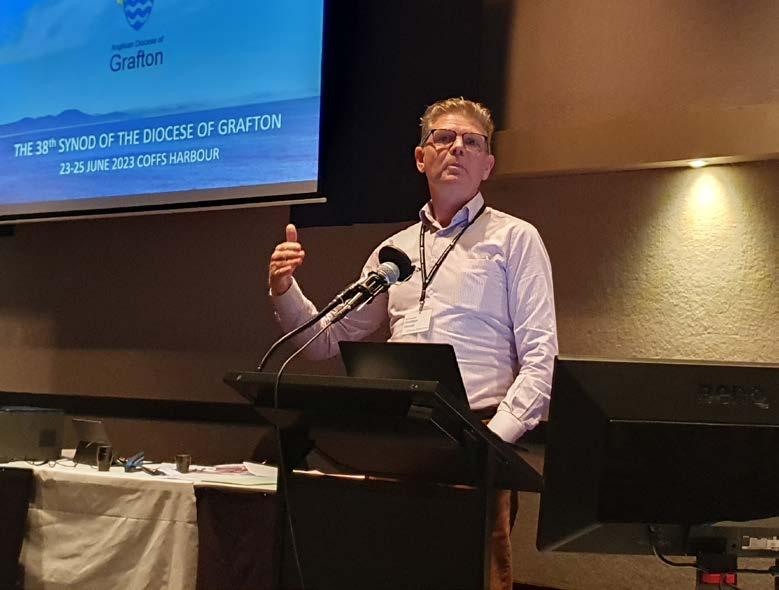
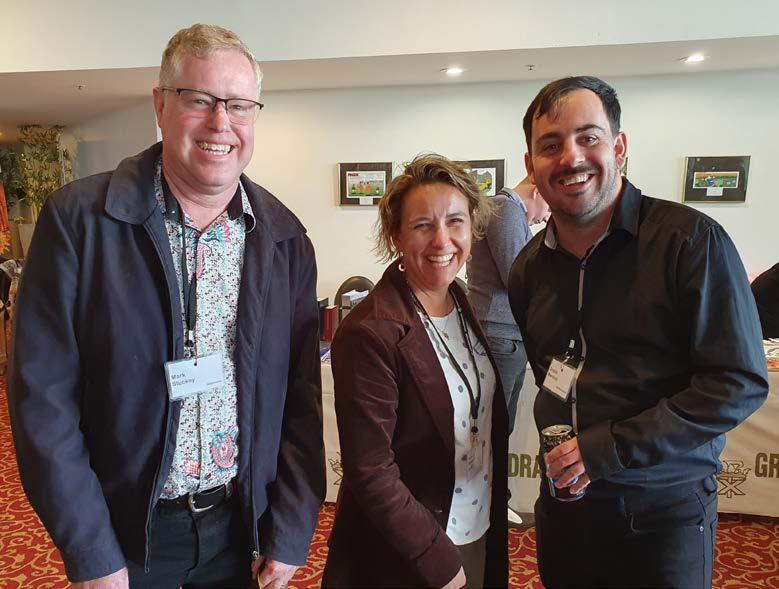
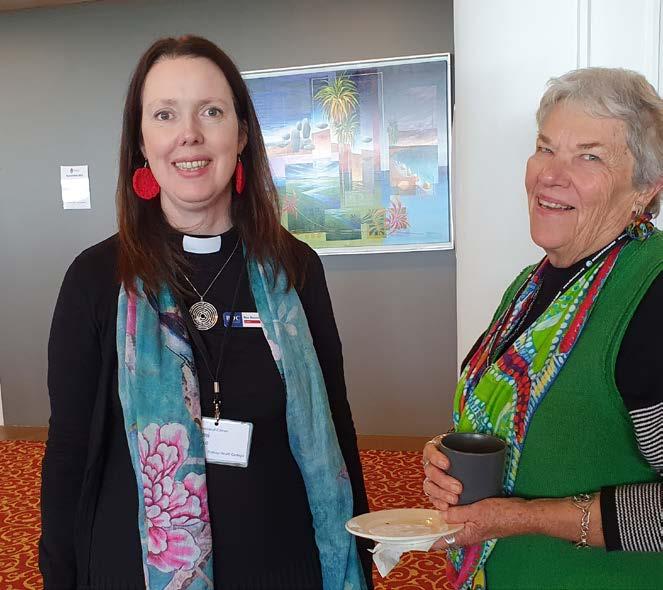

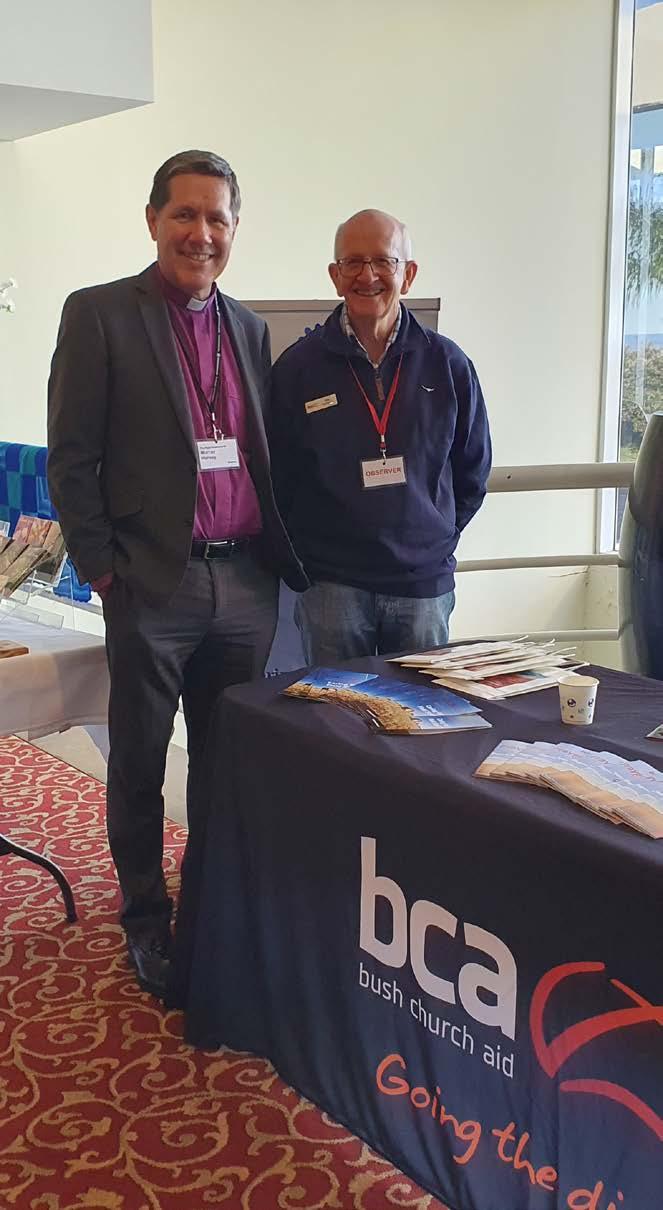 (4) Bishop Murray Harvey with Bush Church Aid representative Rev Ian MacGilvray.
(5) Rev Canon (Dean Elect) Naomi Cooke and Ms Judy Blomfield (Kempsey).
(6) Photo of Jon Cornish moving a motion to investigate clergy moving from a 6 day to a 5 day work week.
(7) Mr Mark Stuckey (Alstonville), Reverend Amanda Larkin (Ballina) and Mr Brodie Marshall (Port Macquarie).
(4) Bishop Murray Harvey with Bush Church Aid representative Rev Ian MacGilvray.
(5) Rev Canon (Dean Elect) Naomi Cooke and Ms Judy Blomfield (Kempsey).
(6) Photo of Jon Cornish moving a motion to investigate clergy moving from a 6 day to a 5 day work week.
(7) Mr Mark Stuckey (Alstonville), Reverend Amanda Larkin (Ballina) and Mr Brodie Marshall (Port Macquarie).
Amen - Isa 49:5-6
Our readings for this evening celebrate the birth of John the Baptist and connect the prophesy of Isaiah to the life of John in Acts. The Psalms reading acts as the fulcrum between the past and the present, the shift from a one nation focus on the task of the Messiah to the idea of an extensive, inclusive kin-dom.
John C. Holbert writes:
"This servant was initially summoned to reconstitute the remnant of the Israelite exiles, but Isaiah suddenly realizes that such a task is too small, too trivial. No, this servant will now be sent as a 'light to the nations,' in order that God's 'salvation may reach to the ends of the earth.'"
The birth or gift of John to the world is integral to this transformation. His naming gives us a glimpse into God’s changing vision for his creation. While Israel remains his first people he begins to reach out and touch the world he loves. John is the forerunner to God's gift to the whole world.
The Statement from the Heart is a spirit document offering the gift of transformational forgiveness and inclusion, not just for Aboriginal people but for all Australians. A contemplative reading of the Statement will uncover the invitation to all to shift from an I focussed world to one where all benefit from the aspirations embedded in it. This statement reminds of the basis of First peoples kinship, relationship based belonging – there is no I in MOB.
On August 14, 2024, my Wiradjuri mob will remember the declaration of martial law by Governor Brisbane against us in Bathurst, NSW. The war of extermination, as it was described, had commenced in January, and didn’t cease, if it ever has, until December of 1824.

This was a war between the Wiradjuri nation and the United Kingdom of Great Britain and Ireland. It wasn’t the action of disparate squatters, but a declared war between nations. Once the "impenetrable" Blue Mountains were crossed in 1813, the colony expanded onto the fertile plains of the west.
…… when Governor Thomas Brisbane came to power a flood of land grants were made. The influx of colonists (impacted) the traditional food sources and sacred sites of the Wiradjuri. By early 1824, war had broken out, with the Wiradjuri adopting a guerrilla style approach under their leader Windradyne.
In 1824, 16 Aboriginals were killed by soldiers on the Cudgegong River near Mudgee, not far from where I grew up, after contact resulted in the death of a shepherd.
The incident at Cudgegong was the beginning of the war of extermination propagated in the Mudgee area by the owner of the property, George Cox. Cox, it is alleged, proclaimed publicly, “the only way to deal with these vermin is to exterminate them – women and children included”. Over the years this unleashed hunting parties, poisoning with flour and water, and stirruping, an act too gruesome to describe here. The violence that ensued has been spoken about by friends of mine as part of an unwanted history in their family stories. By 1876 no local people remained.
The area around Mudgee did indeed live up to the title given to the wars – the war of extermination. In the 1960’s when I lived there as a young child, my father warned us not to eat or drink anything that we didn’t know where it came from. And when we asked why, he would simply say “poison, poison water, poison flour.”
Rev.Almost 200 years later, what has been the response of First Peoples to the destruction of their link to country, lore, language, and spirituality? How have we responded to the genocide?
A quick read of the Statement will reveal no words of demand, violence, or revenge – no evil for evil. Just an open hand and an invitation to forgive and empower.
It is absurd – the absurd compassion of transformational forgiveness and restorative justice in the type of the life, death and resurrection of Jesus the Christ.
It was deemed absurd then and it’s absurd now.
This is an invitation of the type in the Psalm reading, the opening up of redemption to include not simply justice for First People but for all people of Australia – from individual nations to all nations including Australia itself. It is not just about our people, but all people.
What does that absurdity look like?
• We do not seek revenge; we seek to walk across the land together building a better future for this country.
• We seek recognition in the 1901 Constitution, the birth certificate of this nation.
• We seek a Voice on matters that impact our sovereign relationship with country and kin.
• We seek a treaty over time identifying how we live together, sharing this space based upon being included in the Constitution.
• We seek the opportunity to talk about the truth of what happened and what it feels like for both of us to live in this space called Australia.
• We seek the opportunity to make the changes necessary to become a just and whole nation through Makarrata, the coming together after a dispute.
As our text also reminds –
5 And now the Lord says,……
‘It is too light a thing that you should be my servant to raise up the tribes of Jacob and to restore the survivors of Israel; I will give you as a light to the nations, that my salvation may reach to the end of the earth.’ What does this mean in this Australian moment?
• An opportunity has been offered to all nonIndigenous people to begin the process to right the wrongs by welcoming us into their world as equals, persons with a voice, able to contribute equally as co-sovereigns of this land. This invitation is not given to our own people. It is extended to you and if you accept, you will share the blessing of wholeness it leads us toward. We will no longer be persona nullius. We will be seen.
• If you can accept this offer with a yes, we will also allow you to shape your yes through legislation. We have resisted the temptation to tell you how to make your yes work. We have blessed you with the right and privilege to ensure the legislation is fit for purpose. We have resisted the urge to be colonial and demand you do it our way. We know the impact of doing that, as it is what has been done to us from the beginning.
The gift of the Statement reminds us we are not seeking a better future for ourselves, we are seeking a better future for this nation. This is not about First Peoples as a whole or First Peoples as individual language groups, but about what is beyond the edge of everything you know.

As this paraphrase of our text based on Wiradjuri language says;
‘It is too light a thing that you should be my servant to raise up the tribes of Jacob and to restore the survivors of Israel;
I will give you as a light to the nations
that my salvation may reach to the end of the earth.’
Ginaaginaa ngaya-manha nganha mala yumbiyumbidyang-ndhu murrayalalinya mayiny nguran-ban bagaray-bang garranydyang nguran-ban
‘It is reasonable that I ask you to help me
lift up the people on your country, and make comfortable those who remain there.
ngadhu ngalan-guranha-ndhu bangal-buwu-rayi or (nganha-ny-garri) taking the invitation of forgiveness to all beyond the edge of everything you know.'
nganha gurwarra-ngahdi dhulanggarra ngulumunggu bangal-buwu-rayi
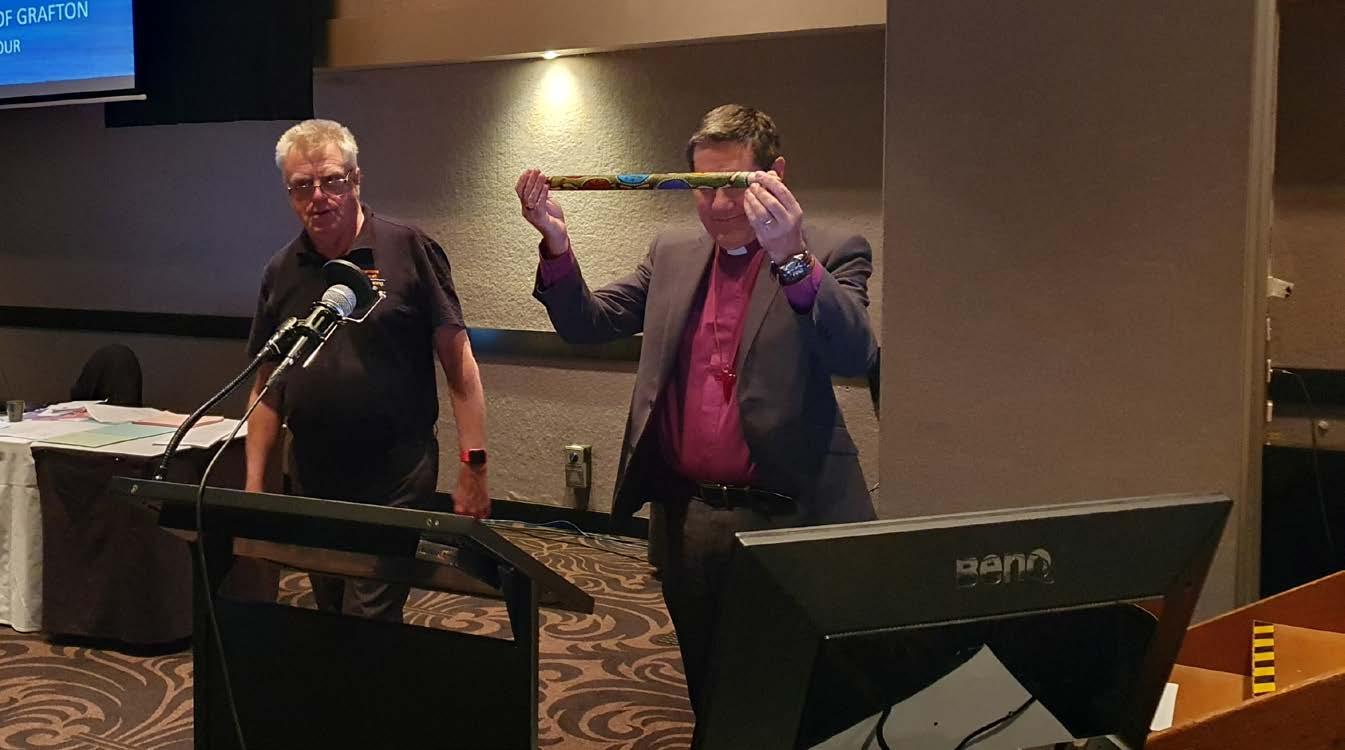
This gift affirms that we as a people are to be a light to the world, a light that opens the possibility of hope and justice and brings about reconciliation and redemption within our own nation as a symbol of what is possible for all nations who pursue justice for all.
This is a gift of the type given to a sinful world in the Easter Triduum – the resurrection of the broken body of Christ still carrying the visible signs of his physical destruction when he did Makarrata for us – he took the
spear to repair our relationship with God and creation. This gift does not hide the evil done. The scars remain and the Christ asks us, as he did with those in the Upper Room, to look at them, no matter how difficult that may be to do.
The light of forgiveness is the gift of the Spirit, and it is required of us to accept this gift from the 83% of First Peoples who support Recognition and Voice and offer this gift of forgiveness for our individual & collective yes.
Scan the QR code below or visit redshoeswalking.net for tools & resources on the Voice, including;

• Papers
• Theological Reflections
• Resources
• Videos
• Powerpoints
Isaiah 49:5-6 (a Wiradjuri paraphrase – GWL 2023) By The Reverend Canon Camellia Flanagan TSSF
By The Reverend Canon Camellia Flanagan TSSF
The most primitive method of stone cutting involved simply hitting a soft stone with a harder one.
When more substantial buildings were made for religious purposes, we find prescriptions as to the use of brick and stone. Moses instructed the Children of Israel in building for worship. Deuteronomy 27:4-6. So when you have crossed over the Jordan, you shall set up these stones, about which I am commanding you today, on Mount Ebal, and you shall cover them with plaster. And you shall build an altar there to the LORD your God, an altar of stones on which you have not used an iron tool. You must build the altar of the LORD your God of unhewn stones.
Is this saying that what is used for worship should not be polluted by the work of human hands? And that we need to come to God in weakness with no efforts on our own behalf?
A wander about Grafton Cathedral, is a masterclass in masonry, designed by Architect John Horbury Hunt, an eccentric whose work was distinctive. The bricks used in the building are made from local salmon pink clay, not the fashionable grey stone of the time, and not one of them is cut, honouring the symbolism of uncut stones.

There are one hundred different shapes and sizes of bricks fashioned in timber moulds. They are laid in a pattern known to bricklayers as old English style. Everything about the brickwork in the Cathedral is designed to point to God. The huge gothic style arches, the Angel wing gothic doors and the many arches in the interior of the Cathedral loosely styled Arts and Crafts with their decoratively shaped bricks, call to mind various passages of scripture when one ponders the scale of the building.
Ephesians 3 17-19 - 17 and that Christ may dwell in your hearts through faith, as you are being rooted and grounded in love. 18 I pray that you may have the power to comprehend, with all the saints, what is the breadth and length and height and depth, 19 and to know the love of Christ that surpasses knowledge, so that you may be filled with all the fullness of God.
The building calls us even to acknowledge our Creator God in the footprint of the cat who walked on the still wet clay brick before it was fired in the kiln, and as the wind, like the breath of God, flows through the western louvres to the eastern ceiling above the high altar we are called to Psalm 46:10a ‘Be still, and know that I am God!’
Iam pleased to announce that following a comprehensive recruitment process, the Bishop-in-Council has appointed Mrs Angela Mula (pictured above) as Diocesan Registrar/General Manager. Angela will take up this appointment on Monday 10 July, following Mr Chris Nelson’s retirement on 7 July.
Angela is an experienced and competent leader with a diverse background gathered in the church and in the secondary and higher education sectors.
Starting her professional career as a secondary teacher at various Anglican Schools across Australia and in the UK, Angela joined the Australian National University in 2006 to focus on educational design. At the University of Canberra (UC) she first led a team of educational designers to engage with faculties in a federally funded structural adjustment project to increase the flexibility and innovation of courses to improve retention and engagement of students. Transitioning to educational partnerships, she played a leading role in establishing a partnerships team to begin the central coordination and management of the University’s partnership arrangements. In this key portfolio, she led the Partnerships Engagement Team to enable UC’s growth through education partnerships with domestic and international third party providers.
Angela joined the Diocese in September 2020 as Deputy Registrar / Executive Officer - Schools and since that time has enabled improved governance, management systems & administrative actions to provide continuous and robust services to ministry units and schools. With
strengths in strategic advice, building and maintaining collaborative and productive relationships with stakeholders, policy and resource development, issue management & business improvement she is looking forward to bringing her passion to the role of Diocesan Registrar/General Manager.
Angela will bring much to this position and I am sure that the Diocese and its schools, parishes and other organisations will be well served by her leadership and expertise. I thank the Bishop-in-Council and the Registrar Selection Committee for their work in recruiting the new Registrar/General Manager.
Having grown up in the Clarence Valley, Angela returned to Grafton with her then young family a decade ago. She loves everything about the region and is looking forward to further connecting with our ministry units as she settles into this new role.
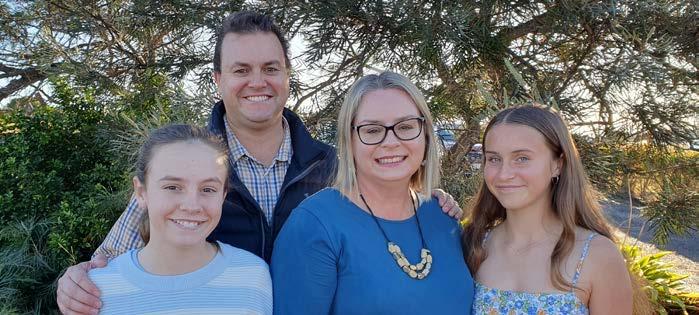
Please keep Angela in your prayers as she prepares to take on this new role.
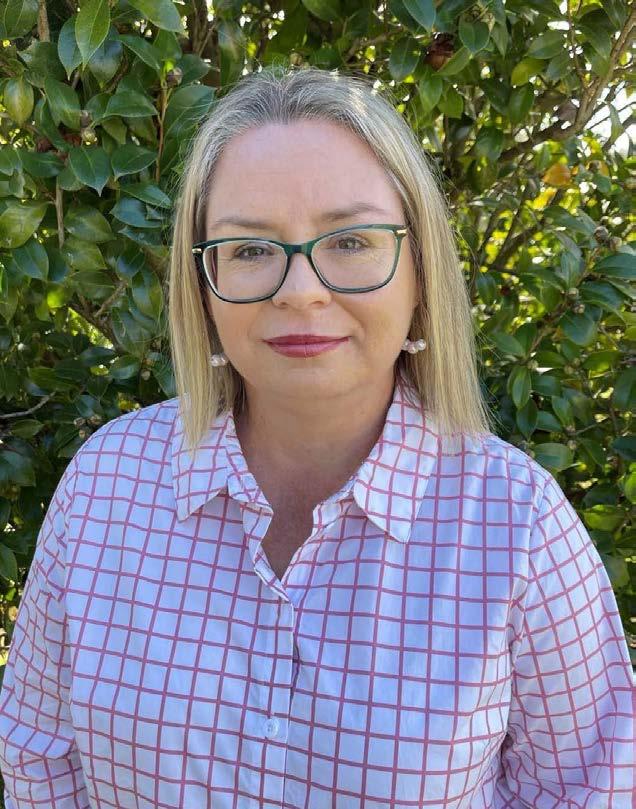
It is with great pleasure I announce that I have appointed The Rev’d Canon Naomi Cooke (pictured above right) as the next Dean of Grafton. The Dean of Grafton is a Senior Appointment in the Diocese. As well as being responsible for the Cathedral Church, the Dean is a member of the Senior Leadership Team of the Diocese and will help the Cathedral and Diocesan communities understand and respond to the challenges of modern ministry and mission on the North Coast of NSW.
I know that Canon Naomi has a strong sense of vocation to this task. Canon Naomi brings over two decades of ministry experience to her new role as Dean.
Since 2016 she has been School Chaplain at Bishop Druitt College, an Anglican School in the Diocese of Grafton at Coffs Harbour. She has also been a member of Cathedral Chapter since 2020. During her time as chaplain Naomi has offered outstanding leadership within the school, as well as being a pastorally caring priest. She has offered a genuinely creative and inclusive ministry to the whole school community.
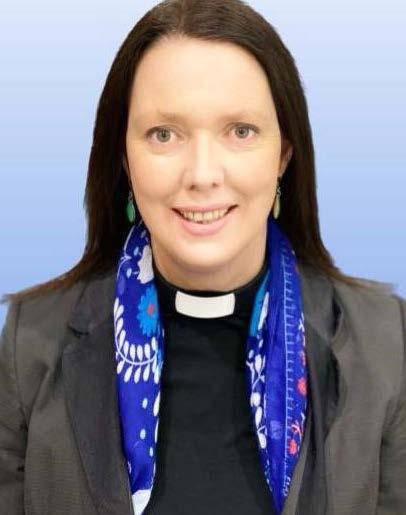
Before coming to Grafton Diocese, Naomi was Chaplain at Trinity Anglican School and at MLC School in Sydney. Naomi is passionate about holding together the breadth of Anglicanism with respectful and robust diversity. She has been instrumental in the journey towards developing a Reconciliation Action Plan for the diocese and building reconciliation with First Nations communities. Naomi is also a member of the Ecumenical Relations Commission of General Synod of the Anglican Church of Australia. Her ministry incorporates Godly Play, Taize prayer,
Prayer spaces, and labyrinth reflections.
As Dean of Christ Church Cathedral Grafton, Naomi has a vision for how the Cathedral might shine its light as an inspiring gathering place for the wider community, with a ministry that embraces the liturgical legacy of the Cathedral while also exploring innovative ways to connect with and serve the community. She is excited about supporting and leading the Cathedral parish's commitment to compassionate action for the common good.
Naomi’s appointment is exciting news for the Cathedral community, the City of Grafton, the Diocese and indeed the wider Anglican Church of Australia. Naomi’s installation as Dean will take place at Christ Church Cathedral Grafton on Saturday 12 August at 11.00am This will be an opportunity for the whole diocese, as well as representatives from the wider Anglican Church of Australia, to come together to mark the beginning of this new ministry.
I am sure that you will want to join with me in praying for Naomi, her husband John, son Santiago (14), daughter Sierra (11), and son Emilio (8) as Naomi prepares to take up this new ministry.
Please also pray for the Cathedral community as they prepare to embrace Naomi as their new Dean.
It's been a busy few months 'Around the Diocese'! Submit your photos and stories tonca@graftondiocese.org.au
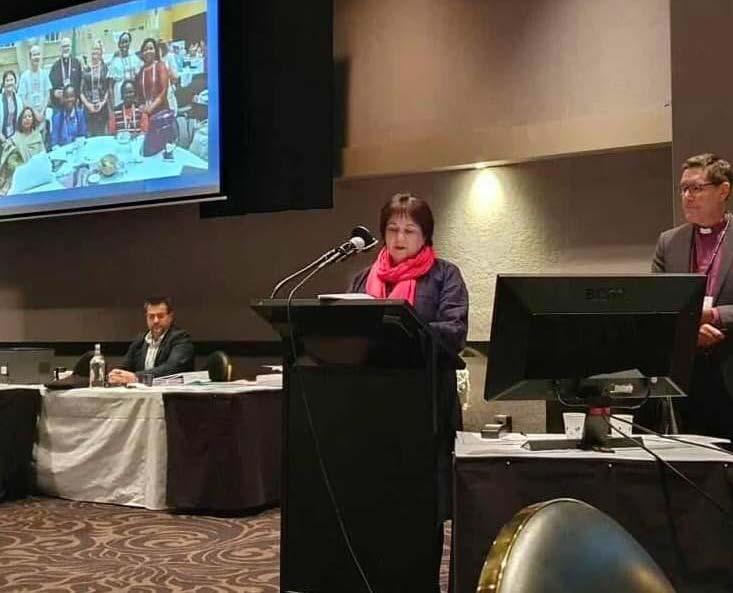

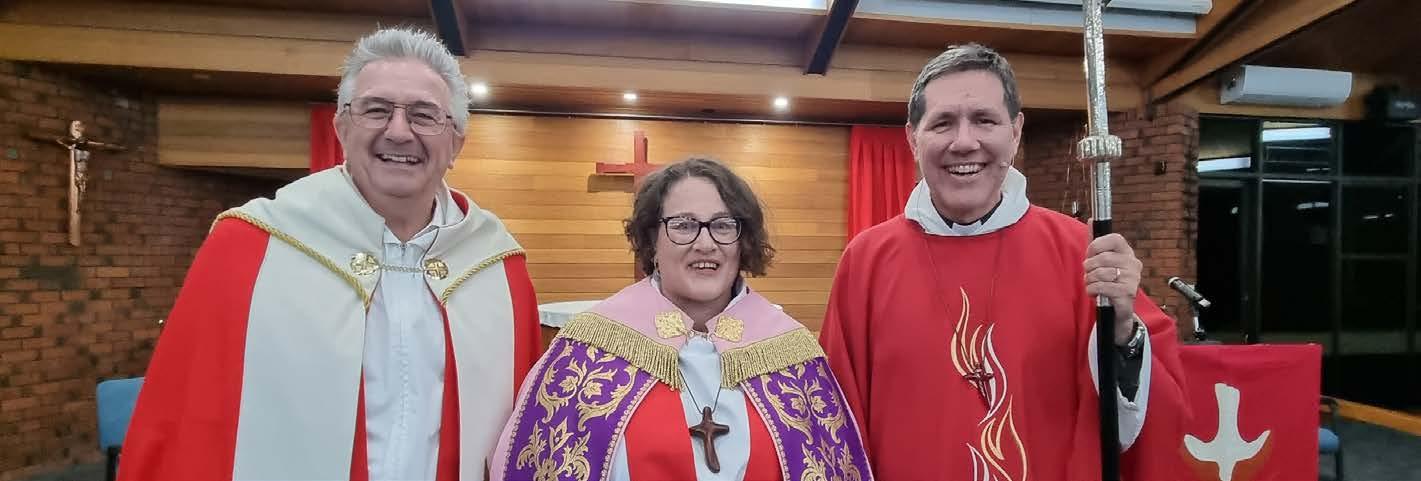
 The Bishop made a pastoral visit to the Parish of Kyogle on June 18.
Collation of Peter Shayler-Webb (left) as Archdeacon of the Southern Region and Commissioning of Sally Miller (centre) as Mission Support Officer Northern Region at the Synod Eucharist, with Bishop Murray Harvey (right).
Bishop Murray Harvey (front) performing the commissioning of Reverend Sally Miller (right) as MSO next to Archdeacon Kay Hart (left)
The Bishop made a pastoral visit to the Parish of Kyogle on June 18.
Collation of Peter Shayler-Webb (left) as Archdeacon of the Southern Region and Commissioning of Sally Miller (centre) as Mission Support Officer Northern Region at the Synod Eucharist, with Bishop Murray Harvey (right).
Bishop Murray Harvey (front) performing the commissioning of Reverend Sally Miller (right) as MSO next to Archdeacon Kay Hart (left)
Above: Graduate clergy training took place at Grafton Cathedral from the 13th to 15th of June. We were blessed to be joined by Reverend Nathan from Coffs Harbour parish and the Reverend Canon Camellia Flanagan. From left: Reverend Nathan Dean, Reverend Aaron Coates, Reverend Amanda Larkin, Reverend Canon Camellia Flanagan, Reverend Ruth Pobjoy and Reverend Jesse Poole. Right top: Reverend Jesse Poole presenting during clergy training, with Reverend Ruth Pobjoy to the left.
A series of heartfelt thank-yous were given during the 2023 Synod 'motion of thanks' to the retiring Bishop in Council Chris Nelson after nearly 10 years as Registrar and General Manager of the Anglican Diocese of Grafton.


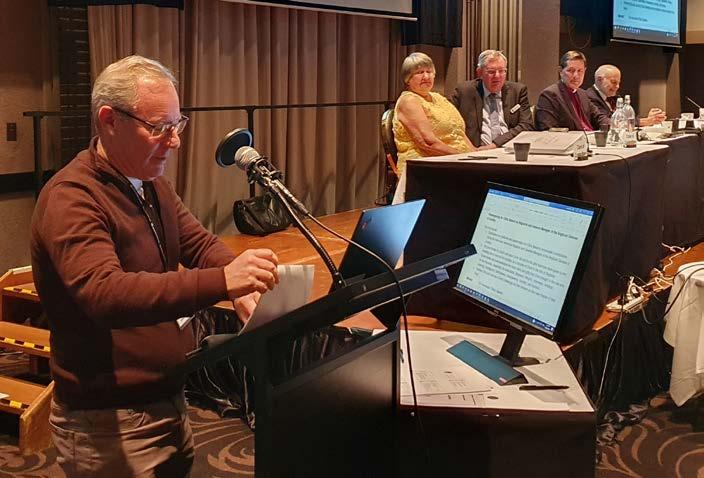
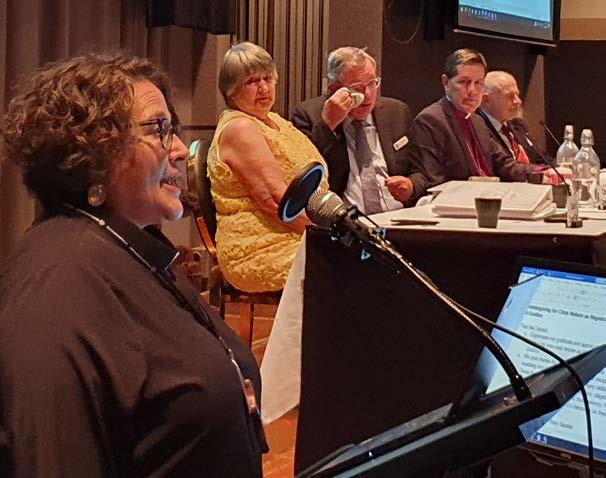
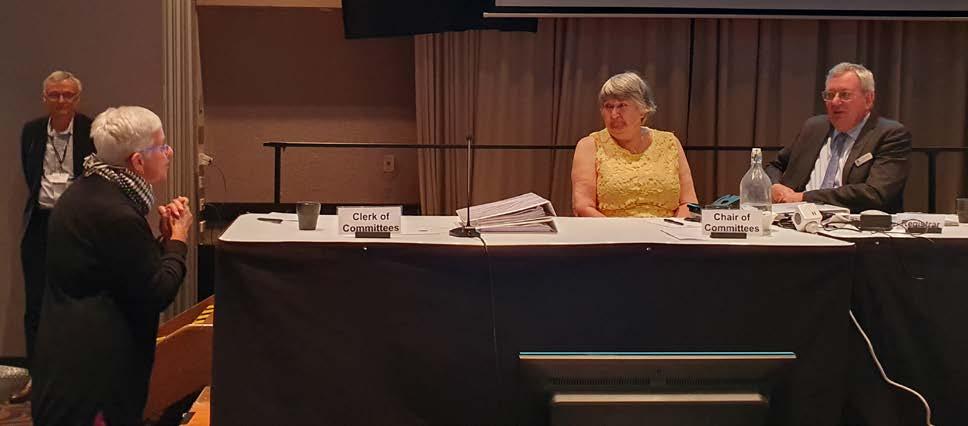
Top: Archdeacon Gail Hagon addressing Jan Nelson & Chris Nelson.
Bottom left: Tears were shed as kind words of thanks were shared by the Reverend Sally Miller.
Bottom right: Mr Rob Tobias wishing the Nelsons every blessing with their future endeavours.
SAVE THE DATE: 30 Glorious Years of the Ordination of Women to the Priesthood - December 2nd, 2023
Onthe 2nd of December we will be celebrating 30 fantastic years of women to the priesthood in the Diocese of Grafton. Please save this date in your diaries to join the festivities in Grafton as we commemorate this occasion. We are also looking for memorabilia from the ordinations in 1993 & other memorabilia of women ministers over the years to celebrate women in Grafton Diocese. Please submit any photos to: tiffany.sparks@graftondiocese.org.au
During its Foundation Day Services in May 2023, Lindisfarne Anglican Grammar School launched its Reconciliation Action Plan (RAP) as well as opened and blessed the Reconciliation Outdoor Chapel as a place of storytelling, connection, prayer, and encounter.

The RAP document was developed over a period of 12 months by the Working Group, comprising students, staff, parents and local First Nations community members. It is our School’s formal statement of commitment to the cause of reconciliation between Indigenous and nonIndigenous Australians.
Lindisfarne Anglican Grammar School, the RAP Vision statement articulates, “strives to nurture a community that fosters culturally safe and inclusive relationships for Indigenous and Non-Indigenous students, staff and families. Through open, honest teachings and truthtellings, we aim to respect and learn deeply from the enduring connection First Nations people have to Country.”
With the emphases on reconciliation, and in particular with our RAP, Lindisfarne Anglican Grammar School acknowledges the Ngandowal and Minyungbal people of the Bundjalung Country, especially the Goodjinburra, Tulgi-gin and Moorung-moobah clans, as being the Traditional Owners and Custodians of the land and water we sit upon, learn, play, live, pray and work.
As our school community reaches north of the Tweed Coast into southeast Queensland, we also acknowledge and recognise the Yugambeh language group of peoples.
Our family of parents, teachers, friends and students
past, present and future is committed to developing our relationship with the wider Aboriginal and Torres Strait Islander community through our RAP. We also acknowledge the invaluable contribution Aboriginal and Torres Strait Islander students, staff and parents make to our community.
At Lindisfarne, we intentionally teach and live the values of compassion, wisdom, and respect. In the spirit of reconciliation, our RAP aims to ensure the presence of First Nations peoples in all that we do.
Our philosophy of educating the whole child, which takes place both inside and outside the classroom, will now have at its heart a series of embedded strategic goals focussed on shaping a worldview of who we are, a world that will always include our First peoples.
In the Uluru Statement from the Heart, our First Australians said, “we leave base camp and start our trek across this vast country. We invite you to walk with us in a movement of the Australian people for a better future”.
With our RAP document and the actions that will be implemented as a result of it, we take up this invitation from our First Nations peoples, and commit to creating a better future for all Australians, and an ongoing appreciation and understanding of Indigenous culture, art, history and lores.
Gracie Lynch, Lindisfarne’s School Captain, in a remark after the moving opening of the Reconciliation Outdoor Chapel, said: “I'm proud that I am attending a school that is taking positive steps towards reconciliation and being both proactive and inclusive with our local community towards bridging the gap with our First Nations peoples.”
 By St Columba Anglican School (www.facebook.com/scasinfo)
By St Columba Anglican School (www.facebook.com/scasinfo)
StColumba Anglican School gathered together to bid a heartfelt farewell to their retiring Principal, Mr Terry Muldoon. It was a celebration of Terry’s contributions to the School that included musical items from some of Terry’s favourite bands, a special piece written and performed by our male choir, Manshed, and some very moving farewell speeches.
Terry has been an exceptional leader throughout his 16 year tenure as Principal, leaving an indelible mark on the K to 12 school community. With unwavering dedication, he has nurtured an environment where growth, learning and compassion thrive. Terry’s passion for education has ignited countless minds, encouraging students to believe in their abilities and reach for their dreams. His commitment to fostering an inclusive and supportive atmosphere has allowed every student to feel valued and empowered.
Beyond his professional accomplishments, Terry has touched many lives on a personal level. His warm smile, approachable nature, and willingness to listen have created a sense of belonging within the SCAS community, and he has been a guiding light for students, staff, and parents alike.
As SCAS says goodbye, they wish to express their deepest gratitude for the immeasurable impact Terry has had on the school community. They will carry the lessons learned and memories created during his time as Principal for years to come. As Terry and his wife Susanna embark on this new chapter of their lives, they have been wished immense happiness, fulfillment, and continued success.

Onthe 9th of July at St. Matthews, South Grafton, representatives of the diocese, family and friends gathered together to say farewell to Mr Chris and Jan Nelson.




Archdeacon Gail Hagon preached a fantastic sermon with a surprise outfit change mid sermon revealing a Blues Jersey to the joy of Chris and Jan who are avid Maroons supporters with the message, ‘we are all team players, even if we wear different colours’.

The sermon was based on a dynamic reflection of 1 Corinthians 12, we are all members of the body of Christ. The readings and the hymns were chosen by the Nelsons and 1 Corinthians 12 was an apt reading to Chris’ approach to the ministry of the Registrar/General Manager of Grafton. The service was concluded with a presentation to Chris and Jan of a financial gift
from the diocese towards their new home as well as flowers and a ‘Body of Christ’ picture signed by all who attended his final farewell. The service was concluded with a drinks and nibbles from a fantastic grazing table. This was a great time for people to share fellowship and stories about Jan and Chris (and there were quite a few stories to tell!)
At each farewell, Chris’ ability to bring people together, his wisdom and his Christian integrity were remarked on. Chris’ contribution to the Diocese is significant and was reflected in the motion at Synod (page 8). Moved by Archdeacon Tiffany Sparks and seconded by Mr David Ford. Grafton Diocese has greatly benefited over nearly 10 years of a Registrar who saw his role as an expression of his faith and the love, planning and diligence that Chris showed was his faith in action. This was the biggest blessing of all. Chris and Jan Nelson will be greatly missed.

 By Lindisfarne Anglican Grammar School
By Lindisfarne Anglican Grammar School
Lindisfarne Anglican Grammar School is thrilled to announce that Alyssa Malone (pictured right), is a finalist for the Education Rising Star of the Year Award 2023. This prestigious nomination recognises Alyssa's remarkable achievements and contributions to the field of education. Her unwavering dedication, passion and commitment have truly distinguished her as a rising star in her category.
Ms Malone is a deserving candidate for this award as she is an expert in her field, consistently demonstrating her passion and skill in mathematics. She has already achieved accreditation as a Proficient Teacher and has her sights set on reaching the Highly Accomplished Teacher level. Alyssa also showcases her leadership abilities through her work in Deep Learning, Gifted Education, Wellbeing and Pastoral programs, and actively engages in highly innovative areas such as STEM, Indigenous Education, and the International Round Square Schools initiative.

Kane Bradford, Head of Professional Practice, Innovation and Partnerships, spoke highly of Alyssa, stating, "Alyssa is undoubtedly one of the most promising young educators I have ever worked with. Her vast knowledge and composed demeanor earn her the respect and admiration of staff, students and the community". Alyssa's nomination is a testament to her outstanding work and the positive impact she has made in the lives of her students.
In addition to Alyssa's nomination, Lindisfarne Anglican Grammar School has also received recognition in the Australian Education Awards 2023 in the category of "Best Use of Technology." This Excellence Award acknowledges Lindisfarne's commitment to integrating technology into education and leveraging its potential to benefit students. At Lindisfarne, our pursuit of technological excellence focuses on delivering tangible benefits to our students. We have implemented several key improvements that have allowed us to remain at the forefront of innovation while adopting an evidence-based approach to provide the best solutions for our community.
Some of the recent improvements include providing clear guidance on interacting with Artificial Intelligence for learning purposes, incorporating virtual and augmented reality into lessons, offering explicit teaching of robotics and coding, ensuring our technology is 'Teaching and Learning Ready,' establishing reliable connectivity across
networks, platforms, and devices, utilising world-leading software, learning, and communication platforms, and creating world-class educational experiences through key external partnerships. These advancements highlight Lindisfarne's commitment to embracing technology as a tool to enhance learning and create engaging educational experiences for our students.
Furthermore, Lindisfarne has been recognised in two additional categories: "Innovation in Learning Environment Design" & "Best Professional Learning Program."
The recognition in the "Innovation in Learning Environment Design" category celebrates Lindisfarne's new Early Learning Centre and the broader learning environment. Through extensive community consultation and a humancentered design approach, we have created a learning environment that promotes high-quality classroom learning, internal breakout spaces, and an outdoor learning space that connects students with nature.
The nomination for the "Best Professional Learning Program" acknowledges Lindisfarne's innovative approach to professional development. Our program empowers teachers to take ownership of their learning journey, utilising the Performance and Development Planning process, Featured Sessions, and Staff-Led PD initiatives. By leveraging the collective expertise of our teaching team, we have scaled the impact of highly effective teaching strategies across the entire school, benefiting all students.
These nominations and recognitions serve as a source of motivation for us to continue striving for educational innovation and providing outstanding learning experiences for our students. We eagerly await the Awards show in August when the results will be announced.

Friday 23 June 2023 we gave thanks for our college and celebrated its foundation and the history that has been created since its foundation 30 years ago and our acknowledgement that we are on Gumbaynggir country. We gave thanks for the Right Reverend Dr Cecil Druitt, the first Bishop of the Grafton Anglican Diocese, after whom our college is named. As we gathered, we remembered the visionaries and founders of Bishop Druitt College: Mr Ken Langford Smith, The Reverend Stephen Pullin, Mr Barrie Ross and Mr Bill Ward.
The planning of Bishop Druitt College commenced in 1991 and opened in 1994 under the guidance of the foundation Principal, Mr Victor Branson.
We acknowledged all who have helped create our Bishop Druitt College community in 2023. We acknowledged and celebrated all those who made Bishop Druitt College the outstanding centre for learning it is today, which is the Bishop Druitt Way and the BDC Advantage. The theme for the celebrations for this Foundation Day reflected our 30th anniversary.
We celebrated the beginning of our college and the influence of our Anglican tradition and our Chaplains who served at the college across the years. The service that our Chaplains demonstrated for students, families and staff continues to demonstrate their faith in Jesus Christ and their sense of sacredness in the Anglican Church. We thank Mr Rodham for sharing their legacy.
In 2023 our Chaplains are the Reverend Canon Naomi Cooke and Reverend Nic Hagon. Our first Chaplain was Reverend Stephen Pullin from 1994 until 1997. Father Stephen heard about the idea of an Anglican school from Bishop Bruce Shultz, which was proposed by the Headmaster of the Armidale School. Father Stephen was a member of the original visionaries who saw the fruition of Bishop Druitt College. He and his wife Marilyn had two children who were also foundation students at the college. He then moved to Mayfield and retired in 2015.
At regular intervals throughout our 30 years, we have enjoyed the care, service and leadership from 13 Chaplains, Assistant Chaplains and part-time Chaplains while they were at BDC. The service continued after Reverend Stephen Pullin to Reverend Bill Carroll in 1998, and then to Reverend Jane Foulcher from 1999 to 2001 who created a Rev Ted or a special teddy bear for primary school students and was the first female rector at St John's Anglican Church after 101 years.
We then saw Reverend Andrew Knox, as priest and teacher, and included a young group of Christian musicians. He also served as a Chaplain in the Australian Defence Force after his time at Bishop Druitt College and Woolgoolga. Reverend Sally Miller was our first Assistant Chaplain from 2005 and 2006 and she became the Rector at Sawtell and then Emmanuel Anglican College in Ballina and is now in her hometown Parish of Casino. From 2006 to 2007 Reverend JP Kavanagh created a senior student ministry group and in 2010 Reverend Lisa Perkins spent 12 months at Bishop Druitt College.
From 2007 to 2016, Reverend Marion Tanfield or Mrs T was appointed Assistant Chaplain. In 2010 Rev T was ordained as a priest and in 2011 Reverend David Morgan assisted for two years and Mrs Dayle Stafford from the office supported Reverend Marion in her role as well. Before Reverend Marion passed, she had also commenced an annual Toys and Tucker appeal at Christmas for families, grew Club Kairo and a ladies’ fellowship group called Chat-Coffee-Cake-Community.
From 2007-2009 Reverend Len Trump assisted. In 2010 Reverend Lisa Perkins was also an assistant Chaplain and Reverend David Morgan served Bishop Druitt College from 2011 to 2021. Rev Dave was known for his rugby passion, support of the Warrina Women's and Children's Refuge and loved attending our outdoor education camps. He also shared the chaplaincy from 2016 with Reverend Naomi Cooke.
We will farewell Reverend Cooke in Term 3, but in her time at the college, she has lived her faith through the line "come as you are" and made all feel welcome at the college and in her service like today, across the JAM or Jesus and Me groups and Godly Play and of course becoming embedded into our senior retreats, Human Rights and Goori group are some examples.
In 2022 Reverend Nic Hagon was commissioned and commenced at our Ash Wednesday service and is both Chaplain at Clarence Valley Anglican School and Bishop Druitt College and has assisted in coordinating an appeal to help families through Anglicare.
Bishop Druitt College is thrilled to announce their National award win, being honoured with the prestigious 5-Star Employer of Choice award by The Educator.
The 5-Star Employer of Choice award is a testament to Bishop Druitt College's dedication to creating an outstanding work environment for its staff. It acknowledges the college's commitment to fostering a culture of innovation, professional growth, and worklife balance, while valuing, supporting, and providing opportunities for its employees.
As an institution, Bishop Druitt College takes pride in nurturing a positive and inclusive workplace that promotes collaboration, respect, and continuous learning. This recognition from The Educator reaffirms the college's relentless efforts in establishing an exceptional employment experience for its dedicated faculty and staff.
Mr. Nick Johnstone, Principal of Bishop Druitt College, expressed his gratitude for the award, stating, "We are immensely honoured to be recognised as a 5-Star Employer of Choice by The Educator. This accolade reflects our unwavering commitment to our staff and their wellbeing. At Bishop Druitt College, we believe that a motivated and supported team is key to delivering outstanding education to our students."
As we celebrate our 30th anniversary, please take time to reflect and give thanks for the diverse and generous Chaplains we have had who live their faith through teaching REP, Chapel service, prayer, faith formation and ministry such as baptisms, funerals and even weddings to our community.
The 5-Star Employer of Choice award is a comprehensive assessment of an institution's workplace practices, policies, and employee feedback. The Educator evaluates various criteria, including professional development opportunities, employee benefits, worklife balance initiatives, leadership support, and overall staff satisfaction.
Mr. Johnstone said that the recognition as a 5-Star Employer of Choice further establishes Bishop Druitt College's reputation as an exemplary educational institution not only for its students but also for its employees. “This achievement serves as a strong affirmation of the college's continuous commitment to providing a stimulating and rewarding workplace environment.”
Bishop Druitt College is proud to be recognised as a 5-Star Employer of Choice by The Educator. The college will continue its pursuit of excellence by fostering an environment that empowers its employees to thrive and contribute to the holistic development of every student.



'The Lord is gracious and merciful, slow to anger & abounding in steadfast love' Psalm 145:8